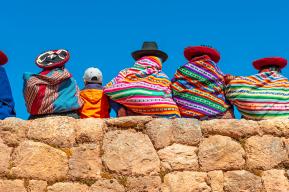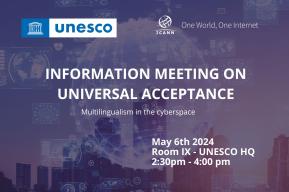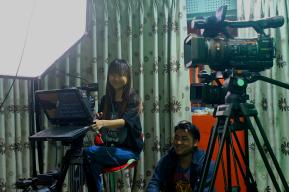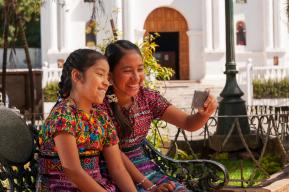Event
Digital Arts and Cultural Inclusion: Navigating the Intersection of Technology, Identity, and Dialogue

Registration
The panelists will provide unique perspectives, fostering a holistic understanding of the challenges and opportunities associated with linguistic diversity in the age of technology and skills sets necessary to empower and recognize the potential of arts education to develop and conserve identity and heritage as well as to promote diversity and dialogue among cultures Digital, art and culture are intrinsically linked. In our modern world, if one is lacking, the other loses its substance. This side event will explore the creation of new typefaces through typography, to the transmission of cultural heritage, via digital art. Crucially, this intersection of education, art, and digital technology extends beyond the confines of traditional learning spaces. It is a catalyst for cultivating a generation of digitally literate and creatively empowered individuals, equipped to navigate the complexities of the 21st century. Through digital art, learners and students do not only consume content but become creators, leveraging technology to express their ideas, challenge norms, and contribute to a global dialogue. It advocates for an inclusive, multidisciplinary approach to learning, where creativity is not just a supplement but an integral cornerstone. Improving the place of art in the educational process, enhancing digital creativity, and above all ensuring that digital art becomes a factor of inclusion instead of a factor of exclusion: these are the issues that bring together ALEF, MarcoPolo700, the International Decade of Indigenous Languages, United Nations University Institute of Advanced Studies (Japan) and Chulalongkorn School of Integrated Innovation (Thailand), with the aim of proposing impactful thinking with concrete results. Partnership, in the context of the UNESCO World Conference on Culture and Arts Education, is a cornerstone for driving meaningful change and fostering collective impact.
Speakers
Moderator: Sarath Chandran, Senior Machine Learning Architect, Alef Education (United Arab Emirates)
Altaci Corrêa Rubim, Associação dos Índios Kokamas Residente no Município de Manaus (AKIM) (Brazil)
Richard Brooker, Public Speaker / Artist / AI Researcher, Alef Education (United Arab Emirates)
Sawaros Thanapornsangsuth, Researcher and Jerome Silla, Research Associate, United Nations University Institute of Advanced Studies (Japan)
Thomas Huot-Marchand, Directeur de l’Atelier National de Recherche Typographique, École nationale supérieure d’art et de design de Nancy (France)
Rupert Gather, Board Member & Independent Trustee, and Shelley Lewis, Co-Chair Middle East Committee, Marco Polo Foundation
Programme
Introduction: Co-Chair of the Global Taskforce on Indigenous Languages and High-level representative from ALEF
- Greetings from the Global Taskforce on Indigenous Languages: Altaci Corrêa Rubim, Associação dos Índios Kokamas Residente no Município de Manaus (AKIM) (Brazil)
- Introduction by Sarath Chandran, Senior Machine Learning Architect, Alef Education (United Arab Emirates)
Theme 1: Beyond Automation: The Challenges and Opportunities of Generative AI Art Education, Richard Brooker, Innovation Lead, Alef Education
- Exploring the challenges and opportunities of generative AI in art and education
- Utilizing AI as a tool for discovery and cultivating 21st-century skills
- Moving beyond automation to enhance creativity, knowledge and critical thinking
- Q&A
Theme 2: Fostering identity and inclusion through cultural transmission / Sawaros Thanapornsangsuth, Researcher / Jerome Silla, Research Associate, United Nations University Institute of Advanced Studies
- Exploration of the global challenges facing cultural preservation and its role in fostering identity and continuity / Insights from the Luang Prabang project, showcasing the innovative approach of using technology and game-based pedagogies.
- Emphasis on the symbiotic relationship between culture, education, and technology
- Q&A
Theme 3: Empowering through design: typography and indigenous languages / Thomas Huot-Marchand, Directeur de l’Atelier National de Recherche Typographique, École nationale supérieure d’art et de design de Nancy
- Addressing the digital exclusion of Indigenous languages and scripts, and the challenges faced by vulnerable communities / inclusion
- Illustrating an interdisciplinary approach involving community members, designers, artists, and technology experts in encoding, digital fonts and type design.
- Q&A
Theme 4: Exchanging creativity through digital art / Rupert Gather, Board Member & Independent Trustee, and Shelley Lewis, Co-Chair Middle East Committee, Marco Polo Foundation
- Unveiling the universal language of art and its pivotal role in cultural exchange
- Introduction to the MarcoPolo700 Digital Art Competition as a platform for fostering creativity and understanding. Highlighting the diverse competition formats: Animation, Interactive Games, and AI-generated contents.
- Q&A
Session Summary and Closing Remarks / Richard Brooker, Lead Data Scientist, Innovation Lead, Alef Education
- Reinforcing the importance of collaborative efforts in cultivating cultural connections








